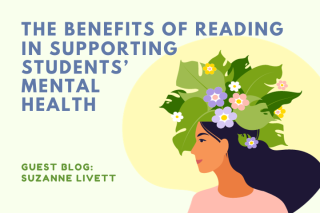- Your School Type
- Solutions
- Resources
- Blog
- Events
- More
- Contact Us
- Book a Demo
- Get a Quote

We are delighted to share this guest blog written by Suzanne Livett, Head of Library Services at Somerville House in Brisbane. Suzanne is a dedicated advocate for the transformative power of literature and libraries. With a background as a Teacher Librarian and a commitment to quality programs, she brings a wealth of experience to her role in shaping the future of school libraries in Australia.
As teacher librarians, we play a crucial role in fostering a love of reading among young people. Beyond our remit to curate collections that reflect the needs and interests of our communities, we are also champions of mental well-being. School libraries serve as physical spaces where mental wellness and emotional health can flourish, especially among struggling readers.
Todays’ students face pressure from all corners of their lives – from striving for academic achievement and sporting accolades, to the pressure from their peers to fit in. It’s no wonder their rates of mental health disorders are higher than previous generations’. I often tell students that if stress and anxiety leave them feeling like they don’t have 20 minutes a day to read, that’s precisely when they need 40 minutes to hit the reset button. The link between reading fiction and stress reduction is clear and encouraging students to escape into the pages of a good book can provide an instant stress relief.
Young people are often forced to grapple with changes in family dynamics and the ebb and flow of friendship groups. Building emotional intelligence and empathy can help them through these tricky times. Exposure to literary fiction, which explores complex and nuanced emotions and social situations, can significantly enhance a young person’s ability to empathise with the thoughts and feelings of others.
Qualified library staff with a well-resourced library can help students’ mental health flourish by putting the right book in the right hands. By knowing our students and our collections, we can transform struggling readers into habitual readers, and in turn, proficient readers into avid readers. In doing so, teacher librarians have the capacity to improve the mental health of every student they encounter.
Lastly, building social connections around books is akin to killing two mental health stressors with one stone. Combining reading with positive social interactions can foster friendships among students as they navigate the tricky fictional worlds of friendships, first loves and family. In reading about and discussing these issues, students are better equipped to navigate them in the real world. We play a pivotal role in fostering these connections by organizing book clubs, reading events and book celebration days. Through these activities in the library, we contribute to students’ emotional wellbeing and lay the foundation stones of social and emotional skills that last a lifetime.
- Suzanne Livett
Head of Library Services, Somerville House Qld.